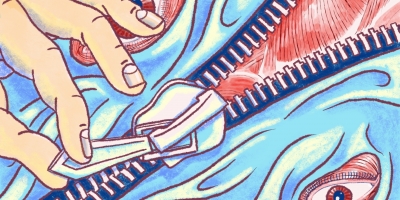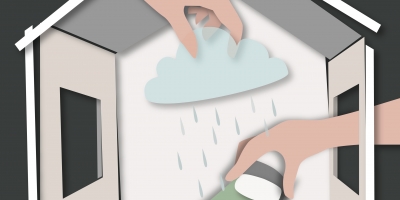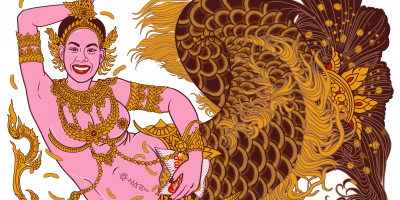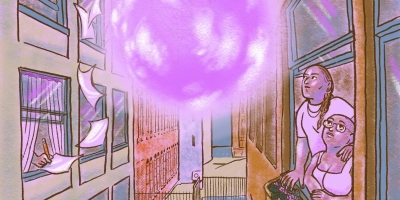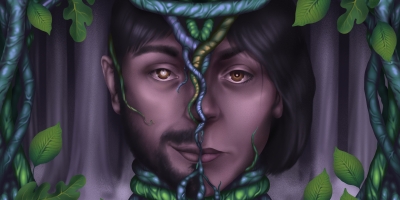Nonfiction
Here’s Your Grandchild
by Ploi Pirapokin

Growing up, my mother cleaned my plates of rice and noodles. Tossed prawn chips, cookies, and my self-worth out of cupboards. Scolded me for buying larger sizes at Uniqlo. She and my father sat me down in various restaurants, in secluded rooms in my grandmother’s house, and in our brown Mercedes-Benz to remind me, with the level of gravitas reserved for news about a death in the family, that once my belly protruded out like that of a pregnant mother of five, I’d never be able to zip into a bias-cut designer wedding dress.
“Your body attracts the wrong kind of men,” they said, as if kind, good men judged women by their dress sizes. As if the label on the back of a sweater determined the quality of character I deserved in a partner. As if straight men even bought their partners correctly sized clothes.
When I turned thirty and still had no need of a wedding dress, they blamed many things: my writing aspirations, my immigration from Hong Kong to California, my American habit of inquiring, “How much will this cost?” up front. But no matter where they began, they’d inevitably end up driving their blame train back onto my body.
And up until my surgery, I believed them to be right.
There were two surgeries, actually. The first one was on January 10, 2021—a day before my thirty-third birthday—when I was admitted to the ER in such agonizing pain that the doctors assumed my appendix had burst. When they tried to confirm it with a scan, they discovered their view was impeded by a cantaloupe-sized benign tumor above my uterus. Unwilling to risk the complications of sepsis, they cut me open immediately, only to discover my appendix was shell-pink and thriving. The tumor wasn’t cancerous, and it wasn’t the cause of this pain, but it was crushing my organs, uterus, and spine in an unnatural way.
My ER surgeon rustled me awake at four in the morning, waving printouts of the scans. “Did you know you have a fibroid the size of a baby’s head in you?”
I did.
“Why didn’t you take it out while you were in there?” I asked, the beeps of my heart monitor quickening.
I had first been acquainted with the fibroid upon graduating college eleven years earlier, in one of Bumrungrad Hospital’s marble-floored offices, during a vaginal ultrasound which the doctors had invited my parents to attend. As I lay on my back with my legs in stirrups, my mother asked if the probe hurt when inserted.
“No?” I said.
She gasped. “Is it because you’re having tons of sex?”
I was.
I didn’t care if I had sex two hundred times with one person or one time each with two hundred different people. I was acting not out of desire, but out of need. I needed to prove that I was attractive as I was. That this curved, bouncy body of mine was worthy of meeting other soft, hard, hairy, smooth bodies, wet with craving. Having sex gave me purpose, a sense of dignified usefulness that my otherwise still, resting body did not have. My value was tied to what I could physically offer, and my partners responded enthusiastically—as most teenage boys do.
Some of these boys stayed and called me their girlfriend. Some of them left. Yet whenever the sex was over, the pooch in my belly remained. A reminder that no matter how high I arched my back or how hard I strained to point my toes as I tried to escape into twenty-minute romps, I was still weighed down by this boulder inside of me. Nothing I did could excavate it or my feelings of lack. During my last year of high school, a white boy had spread the word about my “boring” hand job, snickering to his friends, “She tugged and tugged, and nobody came.” I gathered that had I been skinnier—and ergo a prettier prize—he wouldn’t have dared utter a single chuckle. No one bad-mouthed pretty, skinny girls. At least not to me.
So when the Bumrungrad nurses showed me a bolus floating above my uterus on the black screen, like a manatee bobbing near the coast of Florida, I took this to mean: We have scientific proof that your feelings are valid. We are medically diagnosing your problems as Not Your Fault.
They suggested I keep an eye on it, and on any symptoms that worsened over time. “Don’t concern yourself with it now,” they told me, “but this may require surgery in the future.”
What I had mastered about pain was this: You become used to what you endure. If you’re Thai like me, enduring is part of your blood. You ott-tonn, the word ott meaning to bear, to exercise restraint, to have control over, and the word tonn meaning to be durable, permanent. To be Thai means to pride yourself on your sturdiness, on pain-proofing yourself to survive.
In sixth grade, long before I knew the role the fibroid played in it, I was humbled by my period. Cramps tore through my stomach like a werewolf in heat, leaving behind a homicide of stained school uniforms, blood-red underpants, and muddied seats. It became commonplace to receive a doctor’s note to miss school, then work, then even bachelorette parties one week out of every month. Changing into men’s sweatpants, fainting in hot humid summers, and being force-fed Chinese herbal medicine were also part of this inconvenient routine. The medicine singed my throat all the way down to my small intestine, but it alleviated a few of my symptoms, temporarily. I’d ask my mother to concoct something even more disgusting, with twigs, insects, and tree bark, such that knocking back a cup would wipe me out forever.
It never occurred to me that there might be an underlying medical cause, because my Thai-Chinese parents and extended family chalked it up to my modern, Westernized lifestyle.
“It’s because you drink ice water instead of warm water,” they’d say.
“It’s because you play too many sports after school instead of studying physics.”
“It’s because you were born earlier than your scheduled C-section, thus incurring the wrath of Tai Sui and all the animals in the zodiac who thunder down on your rebellious nature.”
My friends with similar period pains were given similar explanation. Our parents weren’t stupid, but faulting us was easier than admitting that they didn’t know how to fix what was wrong. And since Yahoo was our only recourse (if we could even afford a computer at home), we gargled these superstitions in our mouths and gulped them down. I didn’t want to give my parents even more opportunities to impugn my body, so I held all the suffering inside, to ott-ton. To triumph over the pain.
But when you learn to ignore that kind of pain, how can you follow your doctor’s orders to keep an eye on it? How can you discern if it becomes worse over time?

My first surgery, an emergency, had struck me off my teaching roster and pummeled me financially for months, so I elected to have the fibroid removed in July, when my body would be healed and I wouldn’t be teaching anyway.
One month before the surgery, I sent my parents the CT scan of the blood-suckling fibroid with the caption, “Here’s your grandchild.” I even bestowed a name upon it: Fiby.
They were not amused, but I felt justified.
My fibroid surgeon walked me through the operation. Fiby would be peeled like an orange and dragged out of my belly button like a rope woven out of muscle—a process that would take eight hours.
“I’m not sure we should give the fibroid a name,” she said.
“I like to personify the things I no longer want to hold on to,” I said.
She assured me that there was only a 0.01 percent chance I would die from any of the five complications possible with a myomectomy, but still asked for the name of my power of attorney. Because we were in a pandemic, kept apart by global quarantine restrictions, my parents couldn’t be there in time, so I forced my best friend of thirty years into the role.
“If they have to amputate my arm for me to survive, what would you say?” I asked her.
“Wait, why would they need to amputate an arm?”
“Say yes to a blood transfusion. Make sure they resuscitate me. I want to hate you for ordering me to hike the Dolomites for your goddamn bachelorette.”
Then I prepped my parents: “Natasha is going to make my medical decisions until you arrive, and then all the power to kill me will be transferred to you two.”
My mother cried. “You must be so scared going through this all alone.”
She sounded genuine, but her comment enraged me. I had been enduring all this pain, insecurity, and doubt alone for the past thirty-three years, and my parents had been blaming me for it the whole time. They only considered it debilitating now because there was suddenly a 0.01 percent chance I’d wake up dead (and maybe because I promised that if I did, I’d haunt them forever).
I didn’t know how to accept their sudden concern for me or how to plan for post-fibroid life. What would I do if I couldn’t prove my worth through suffering? If I didn’t have a medical diagnosis to blame my insecurities on? I’d no longer have a muscly scapegoat for my feelings of lack—no more clamping down on anguish with gritted teeth to demonstrate my tenacity.
I woke up alone after eight hours of surgery and chewed on two graham crackers to prove to the nurses I could keep down food before being ushered out. Hospital beds had to be emptied for other non-COVID-related ER patients. My friends, colleagues, bosses, and even two ex-boyfriends who rose from the Deadlands of Blocked Numbers showed up. I received cookies, infinite bouquets of Edible Arrangements, and cards featuring the loves of my life, the K-pop band BTS.
My parents weren’t as gentle. When it became clear I would survive, they switched from crying for me to chiding me for not getting surgery sooner. My pain was no longer my fault for crawling out of the womb too early; now it was my fault for ousting Fiby from the womb too late. They seemed afraid of being kind, as if other fibrous grandchildren would see it as an invitation to move in. In a roundabout way, they were right; my surgeon told me the fibroid had been nurtured by my “hospitable hormones,” “welcoming uterus,” and—this is a direct quote—“cute fallopian tubes,” as if my body, having received only hate for so many years, tried to divide its cells and split apart to form a new body immune to my parents’ shame. A noncancerous tumor was the best it could manage.
In the mirror, when I saw myself from the side, my belly was flat. After a lifetime of dieting, swallowing laxatives, and strangling it in shapewear, my pooch, that flesh-solid mass, was now—poof—gone. Suddenly, I could sprint at Barry’s Bootcamp any day of the year, loll on blankets in Dolores Park for hours without running to the bathrooms, and bleed normal amounts of unclotted blood once a month. I sang like a lean, cackling, post-divorce Adele. I’d proven my parents wrong on their own terms and persevered to sashay in leather leggings to and from the grocery store. My lack seemed to have vanished, as though my insecurities had been hauled out of my belly button like a string.
Yet my ecstasy was accompanied by a more complicated feeling. In a deadly pandemic when many Americans couldn’t afford healthcare, when millions of people around the world were dying or losing their livelihoods due to COVID, was I really celebrating how darling I looked slipped into bias-cut gowns?
The Thai word for “hollow” is kleurng, which sounds like an echo of fists rattling an iron cage. It’s a derogatory slang term for vapid Instagram influencers who show off the newest “it” bag in their latest haul videos, or for anyone else who lacks the substance and intellectual weight to ground them. Even though my surgeon had promised me that I’d be able to curse her during childbirth, even though my writing and teaching schedules were locked back on track, and even though I’d met my health insurance’s deductible, which meant the operation cost zero dollars, I felt hollow. Did I really need to be sliced and diced like tuna-belly sashimi in order to achieve self-esteem? It was as if I only considered myself worthy if I was either enduring great suffering or inhabiting a body that my parents would praise, instead of saying, “I’m intrinsically valuable and deserving of love, with or without Fiby!” If you pounded my uterus from the inside out, you’d hear the reverberations of your fists. Kleurrrrrrrrrng.
My first medically okayed trip was to Palm Springs for a bachelorette party, where a few of the bridesmaids wanted to solve the problem of me being single.
“You can’t expect to meet men from your couch,” one offered.
“Maybe you’ll find ‘the One’ at a BTS concert!” another said, beaming.
“Maybe I just underwent two surgeries this year and want to spend some time alone,” I said. My new form needed more time to settle and strengthen, to fortify itself against outside judgment and unsolicited advice.
In New York for that bride’s wedding several months later, I bought coffee from SoHo to the Upper East Side. Danced with friends until four in the morning in Brooklyn, offering to spit into one’s eyes when he complained that his contact lenses were dry. Met up with an ex-boyfriend who had mailed me an enormous gift basket and then taken me out to a tasting-menu dinner to celebrate my survival.
Before we slept together, I checked in with him. “Are you okay with this being no-strings-attached?”
“Are you okay with it?” he asked.
“I want to show off my new body to someone who wants to see it. Let’s not do it if it’s a chore for you.”
He laughed. “It’s not a chore.”
He didn’t leave my bedside for the entire weekend. While he snored loudly on the pillow next to me, I tried to remember: Why did we break up again? He had confessed he “couldn’t do it anymore”—our long distance—which meant he didn’t want to commit. I’d cried for days, bawling into the phone, my pillows, a hand towel, wondering what was wrong with me. Why wasn’t I enough? Was it my body, hidden in baggy clothes? My never-ending physical travails, all those excuses for missing out on life? What did I lack that he had to search for elsewhere?
That was five years ago, and the hurt had faded, like the small red scars from my surgery will do someday. In the dark, I cupped my ex’s tight curls and kissed his forehead. What a handsome, sensitive man, who was trying to make himself relevant again in my life. Maybe the breakup really had been about the distance. Or maybe blaming it on distance alone was too simple, but it was much closer to the truth than blaming it on the idea that I had the wrong body type or was bad at hand jobs or bled through my skirts with terrible mood swings or suffered too much or didn’t suffer enough.
I had spent my life thrashing like a sea creature caught in a net, relentlessly pounded by the current but never trying to gnaw my way out. I ott-tonned, waiting for an opening on the surface instead of figuring out a way to the top on my own because I was worth living for—not because I was strong enough to endure whatever came my way. As I caressed the scruff peeking out of my ex’s jaw, I thought that if he wanted to keep me, he’d have to grab on tight, because I’m no longer holding on to the things that don’t want me. From now on, I’m going to be harder to catch.

